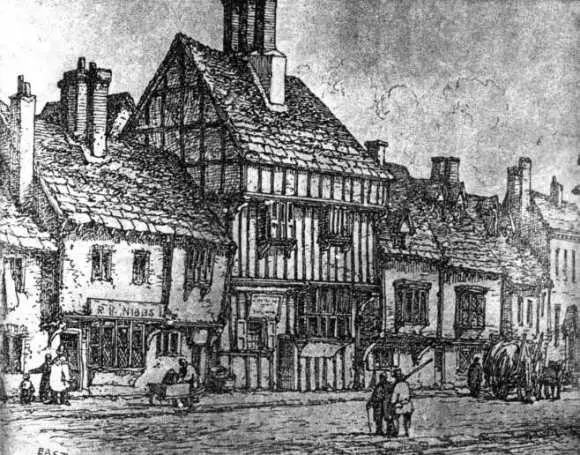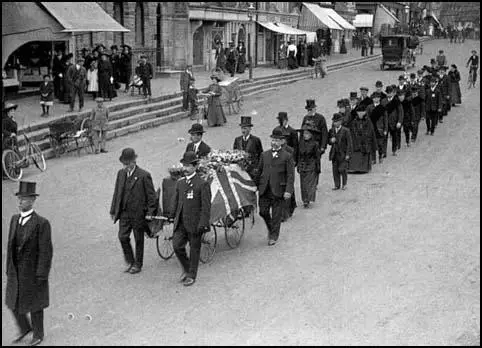George Brinkhurst

George Brinkhurst, the son of John Brinkhurst of Hollybush Farm, was born in 1856. John Brinkhurst had originally been a farmer but after selling Hollybush Farm he moved to 68 Moat Road. John Brinkhurst became the manager of the shop owned by Thomas Charlwood in London Road. In 1869 John Brinkhurst moved across the road and opened his own saddler's shop. At the age of ten George began working with his father. As well as training his two sons, Frank and George, John Brinkhurst also taught the trade to the four Rice brothers, Thomas, Henry, George and Joseph. In 1876 John Brinkhurst sold his business to Thomas and Joseph Rice (£100 goodwill and £185 stock).
Frank Brinkhurst was a committed Nonconformist and was a member of the Moat Congregational Church. His sons, George and Frank, shared his religious beliefs. Like most Nonconformists in East Grinstead, John, George and Frank Brinkhurst were all supporters of the Liberal Party. George and Frank were both members of the East Grinstead Urban Council and tended to support reformers such as Edward Steer, Joseph Rice and Thomas Hartigan.
George and Frank were strong supporters of Edward Steer's proposal that the East Grinstead Urban Council should provide electric street lighting. The scheme was opposed by Wallace Hills and other conservative members of the Urban Council. Edward Steer accused Hills of being influenced by his position as a director of the East Grinstead Water and Gas Company. George Brinkhurst complained about the way Hills had reported the issue in The East Grinstead Observer and called for him to be excluded from council meetings.
George and Frank Brinkhurst were both members of the East Grinstead Anti-Compulsory Vaccination Society. Both men refused to have their children vaccinated. The main argument put forward by George Brinkhurst was that it was an example of "the toffs experimenting on the poor".
George worked as a harness maker in a small workshop at the back of Broadley's premises in the High Street. His brother Frank changed jobs and became an undertaker. Frank was a successful businessman and became more conservative as he got older (died 1926). However, George retained his radical views until his death in 1930.

Primary Sources
(1) East Grinstead Observer (10th August, 1901)
George Brinkhurst said that as a consequence of the unfair and biased reports appearing in the East Grinstead Observer, the reporters of that journal be in future excluded from the meetings of the Council. The newspaper is more and more represented one man's opinion (Wallace Hills). The newspaper seems to take a delight in ridiculing the work done by members of the Council.
(2) East Grinstead Observer (13th April, 1901)
The East Grinstead Anti-Compulsory Vaccination Society arranged a reception and demonstration to welcome back George Baker and William Jenner from Lewes Prison. George Brinkhurst said he knew of no anti-vaccination society in England which was doing so much as the East Grinstead Society, and he thought that East Grinstead could show as many gaol birds proportional to its size as any place in the country.
(3) George Brinkhurst made a speech at the East Grinstead Anti-Compulsory Vaccination Society meeting at Queen's Hall on 13th December, 1901.
This meeting sympathises with those of our fellow townsmen who are being persecuted and prosecuted simply because they are seeking to protect the lives of their children. We hope they will resist to the utmost this filthy and superstitious rite which has proved to be both hurtful and dangerous.
(4) East Grinstead Observer (30th August, 1930)
The sudden death of George Brinkhurst took place on Tuesday evening. Mr. Brinkhurst was 73 years of age, and, in fact, would have been 74 next month. Right up to the time of his death he worked hard in his business of a leather and harness maker, very often up to a late hour.
George Brinkhurst had been to work and also his allotment, but on returning home at 8.15 in the evening he complained of pain. He went to bed with the assistance of his wife and his daughter. "I thought he had dropped off to sleep," said Mrs. Brinkhurst, "so I left the bedroom quietly. About half an hour later I went upstairs to see how he was and found he had passed away."
George Brinkhurst had been married 52 years. There were thirteen children, but two of the boys died during the war, leaving eight girls and three boys. Most of the children are abroad, chiefly in Canada.
For six years he served on the East Grinstead Urban Council, being returned to office on two successive occasions. His outspoken methods and clearness of thought made him a valuable member. Throughout his life he had watched the growth and improvement of the town with the keenest interest and his reminiscences were always interesting.
